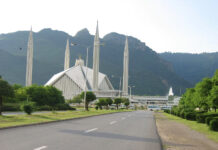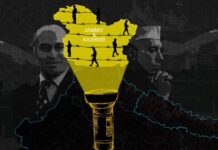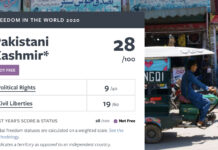I was asked by the human rights activist, Tanveer Ahmed, to offer my thoughts on the failures of Pro-Independence Azad Kashmiris to prosecute a freedom struggle against the Pakistani State, within the context of the Kashmir Conflict. This is a very broad area to cover, and I am only able to offer my insights about British-born Azad Kashmiris and their complete absence from the spaces occupied by Azad Kashmiris in AJK, many of whom come, periodically, to join them in the UK, whilst pursuing an independence quest.
We speak of this demography as the Azad Kashmir diaspora, possibly more than 1 million people in the UK if the writings of British academics are to be believed. More correctly, younger elements of this population do not see themselves as being separate from the mainstream British society. They are Britons of Azad Kashmir descent. Pakistan and India want to present this ethnic group as Panjabis to disconnect them from Kashmir’s Independence Politics, heritage and history, in the same way Russia claims that Ukraine is Russia, and thus has no right to exist. We are dealing with a false narrative.
Azad Kashmiris are loyal to the UK and one will be very hard pressed to find British Azad Kashmiris criticising Britain, a nation they are justly proud of. It’s become an unspoken rule not to speak ill of Britain, something that seems to be missing from their counterparts, the British Pakistanis, who follow developments in Pakistan closely, taking their cues from over there, and not here.
British Azad Kashmiris are distant to Pakistanis because of dehumanising bigotry emanating from that community, for whom racism, it seems to me, is an opportunity to get ahead in life in the UK. Racism does exist in Britain, but Pakistanis are far more discriminatory and persecutory in their behaviour towards their minorities than ordinary Britons. Pro-independence Kashmiris in AJK and poor people in general are being persecuted by Pakistan – the State. Their very existence is threatened by Pakistan, but this seems lost on Pakistani activists in the UK decrying the racism of white Britons. Pakistan committed a genocide against East Pakistan in 1971, supports China’s persecution of Turkic Uighur, and has criminalised Ahmedis, a minority Muslim sect. The majority of British Azad Kashmiris support independence for Kashmir, which means independence from Pakistan, and not just India.
But in the UK, the Kashmir Independence Movement for Azad Kashmiris in Britain is the prerogative of a loosely affiliated group of activists, who don’t really interact much with their British-born counterparts. I have my suspicions, and I am beginning to believe, with reason, that these interests are promoted by Pakistan to undermine independence for Kashmir – the entire State.
There are, however, some luminaries amongst the Kashmir Independence Movement, but for the sake of honesty, I must point out that the movement is defunct where actual outcomes are measured. It’s leaderless with no real appeal for people outside the immediate circles of Urdu speaking Azad Kashmiris, meeting up to discuss politics, sipping tea and putting right the wrongs of the world. This is how the movement is perceived by critics, even amongst independently-minded activists upset with the lack of progress. Many of the genuine Independence activists are living in exile in the UK, Canada, America, Western Europe for simply daring to speak truth to the Pakistani Occupier.
I will speak of such people as the pro-independence Kashmiris. It captures the idea of a group of activists who advocate for independence, for all the right reasons (human rights/economic, political and social freedoms/self determination), but have no corresponding “story” or “plan of action”, which are the hallmarks of any successful resistance movement.
The idea of difference between groups is key to such endeavours, without the sense of difference, one will have difficulties prosecuting a war of freedom. This is the reason why Kashmir’s Occupiers (India-Pakistan) call pro-independence Kashmiris “separatists”, the idea here is that a section of society is separating from something that pre-dates them (shared unity).
In other words, separatists are agitators and not bonafide freedom fighters, the likes of the South Africans (Black Africans) or Palestinians (Muslim Arabs). “Sameness” becomes the point of departure from the separatists who are essentially the same people as those from whom they seek separation. This is the reason why Indians and Pakistanis constantly push the false ethnic narrative that Azad Kashmiris are Punjabis and Muslims, they are not ethnic Kashmiris seeking separation from a Hindu-India – the Pakistan and Indian position.
Valley Kashmiris are Muslims, Pakistanis are Muslims, thus we have “sameness”.
Punjabi Azad Kashmiris are Muslims, Punjabi Pakistanis are Muslims, thus we have “sameness”.
India pushes the “sameness” narrative by arguing that the real Kashmiris, the aboriginal Kashmiris (note, the nuances in the words) are Kashmiri Pandits, strategically renamed Hindu Pandits, who have been ethnically cleansed from their Hindu homeland; “sameness” to India here requires saving/protecting/defending. India’s Kashmiri Muslims were all Hindu Pandits, but they were forcibly converted to Islam, such is the false argument. Some Valley Kashmiris (Muslims) feel flattered by the claim that they were high-caste Brahmans unaware that the false narrative in question is being used against them. Also, the ethnic claim that Valley Muslim Kashmiris are the real Kashmiris is similarly an ethnic ruse that India and Pakistan use to disconnect “Punjabi” Muslims from Valley Kashmiris politically; again this propagandistic contraption is used with devastating effect. Lots of British Azad Kashmiris have fallen for the ruse with no push-back from the activists – this would be akin to being able to understand Urdu and Punjabi songs and movies as proof of one’s ethnic identity. Ethnic (group) identities do not work like that the world over.
Ethnic Muslim Kashmiris think by being “special”, they are different, distinct and unique, unaware that when they also deploy the claim of their uniqueness (a bad idea, anthropologically speaking), they are destroying the coherence of a pro-independence narrative that connects them with Azad Kashmir and Gilgit Baltistan. The Pakistanis promote the idea that Gilgit Baltistan is Dardic; Valley Kashmiris are Dardic – “sameness”; thus both communities share an ancestry unlike Azad Kashmiris, who speak Punjabi, which means they are of Punjabi ancestral roots. The “historical” claim is false.
We are dealing with a false narrative.
Azad Kashmiris are not ethnic Punjabis.
From the brief behind Tanveer Ahmed’s question, indifference to these dynamics on the part of the pro-independence Kashmiris critically damages how far they can reach out to British Azad Kashmiris. They do not understand how independence narratives work, and the types of “stories” needed to effectively prosecute a war of independence. Some British Azad Kashmiris have bought into the lie that they are Pothwari-Punjabis, when in fact, they are not. Aside from the fraud behind the claim, the idea of a pan-Punjabi identity is subject to enormous contestation even within the discipline of Punjab Studies. Most of the writers are Indians and Sikhs, and they do not speak about Azad Kashmiris anywhere in the literature.
The idea of the British Punjab Province is a British invention (post 1850s).
The idea of the Lahore Province is a Mughal invention (post 1600s). The word Panjab is actually a Mughal metaphor for the flat Plains of Central and Eastern Punjab. The term was then used interchangeably for the entire Lahore Province. It was the British who created the Punjabi ethnic identity (people, language and culture), and not the Mughals, or even the self-affirming Punjabis themselves.
There are no ethnic Punjabis in history prior to the constructed geographical identity.
What is today Azad Kashmir including the entire region of Erstwhile Mirpur District (Chibhal), prior to Akbar’s reforms (see Ain-e-Akbar of the Akbarnama) was part of a mountainous region connected to Kashmir, one region amongst other ethnically diverse regions. It had never been connected to the Plains of India, what the Mughals called Hindustan, and latterly, Panjab.
Crucially, for the purpose of my assessment, Azad Kashmiris are not included in Punjab Studies’ discussions, which gives the lie to the Pakistan claim, not least because it was Punjabi Muslims, taking their political cues from Hindustani Muslims, who began the murder of Sikh and Hindu Punjabis in 1947. It was the Punjabi Muslims who started the communal expulsions in Rawalpindi, not the Punjab Plains but the Punjab Province. These distinctions are very important. Having gruesomely partitioned British Punjab Province – a British invention, Pakistani Punjabis are now lecturing Azad Kashmiris about their ethnic “sameness”, despite the former choosing to speak Urdu (Hindustani), and not Punjabi. It seems lost on pro-independence Kashmiris that Azad Kashmiris are denigrated for speaking Pahari – the native tongue of Azad Kashmir, which might account for the fact that so many native speakers, the activists, choose to speak Urdu because they too feel Pahari is a lessor-tongue. This “sameness” with both Indians and Pakistanis further compounds the problems besetting the pro-independence narrative.
Aside from the aforesaid reasons, pro-independence Kashmiris have a very small following in the UK despite the sentiments they embody, which resonate beyond their immediate circles to impact larger numbers of aggrieved British Azad Kashmiris. Azad Kashmiris returning from Pakistan have developed a ritual of speaking ill of the Pakistan Power Structure – enormous corruption, gender inequality, bribery, lack of humanity, terrible infrastructure, dehumanising poverty, greed, deceit, no airport in Mirpur, no hospitals, no quality hotels – all of which point to “difference” because Azad Kashmiris are penalised for being Azad Kashmiris. When they travel to Pakistan’s Islamabad region, life becomes easier. It is as if, the Pakistanis are deliberately disinvesting Azad Kashmir.
There is a sense that British Azad Kashmiris are different to British Pakistanis, more akin, perhaps, to ordinary Britons of the white working class, with whom Azad Kashmiris share a lived experience, except for the highly pronounced white supremacist and Islamist narratives that separate them. There’s a kind of rejection of the “pompous Pakistanis” (the self-affirming, non-native Urdu speakers) who are not really indigenous to Azad Kashmir, even ironically Pakistan, having adopted North Indian cultural norms. At present, this is just a feeling on the part of lots of people, and it has no corresponding narrative, but even the hint that someone speaks Urdu, non-natively, elicits laughter and derision from large numbers of British Azad Kashmiris, and even some rural Pakistanis. The idea of speaking Urdu to one’s family, non-natively, seems unnatural to Azad Kashmiris, who speak English on account of their birth and upbringing in the UK, which is a natural and unconscious act. Speaking Urdu, despite Urdu not being the native tongue of Pakistan, is a conscious act borne of an inferiority complex.
I’ve tried to explain this to some pro-independence activists who have difficulties weaning themselves off Urdu in their public speeches and presentations. They don’t have the foggiest clue that when they speak Urdu, they are strengthening the Pakistani-Urdu identity for lots of young Azad Kashmiris who could be very easily reached in Pahari and English. If the Pakistanis try to engage in a similar device (Pothwari-Hindko), it would call into question their commitment to the Urdu language policy which undermines the place they’ve reserved for Urdu. This attempt on their part could be debunked easily, exposing the hypocrisy of their position. It is a well-known fact in British Azad Kashmiri circles that Punjabi is looked down at by Pakistani Punjabis, so why now would they start speaking the Pothwari dialect to Azad Kashmiris to elicit “sameness”?
In recent years, developments have been going in favour of the independence narrative, and not because of pro-independence Kashmiris, but because the British Azad Kashmir community is coming of age. Young members of the community, without any type of encouragement from Azad Kashmiris or Pakistanis, have started to produce Pahari-Mirpuri content informally. The messages left on their YouTube videos are very revealing of the dynamics I have tried to explain in this post; one can see the anxieties of people trying to control the narrative. Any mention of Kashmir within the discussions elicit claims that Mirpuris are not really Kashmiris, but are more similar to Punjabis and even, oddly, Bengladeshis, a region that is more than a 1000 miles away on the other side of the Indian Subcontinent, that broke away from West Pakistan in 1971.
There is, of course, a city called Mirpur in Bangladesh.
This is one way of using a narrative in conjunction with algorithm manipulation to influence search results. For Pakistanis to say another person looks like a Bengali, is usually deployed as an insult but this is lost on naive and impressionable YouTube influencers who have no sense of how deeply ingrained colourist prejudice is in Pakistani society. When Kashmiris from the Valley search material on Mirpur, the algorithm manipulators influence the search results to take them to the Mirpur in Bangladesh. It is an attempt to disconnect two Kashmiri populations by influencing how they view one another.
Educated British Azad Kashmiris have an acute sense of the derision and belittling that comes from fellow Pakistanis, who love throwing them under the bus whenever scapegoats are needed to redeem Pakistan’s reputation. These Azad Kashmiris include doctors, lawyers, academics, university students, business people, free thinkers, writers, Atheists, converted Christians, Feminists, Socialists, and highly devout Muslims, who don’t take too kindly to being belittled by people feigning solidarity with them. Even Azad Kashmiris in the British Parliament are aware of what I am saying. Pakistanis are constantly degrading Mirpuris on Social Media.
British Media has not helped by shining its torch on problem Pakistanis (grooming gangs/extremists/Satanic Verses), but the reactions of mainland Pakistanis compounds the problem further. It is accepted within the wider British Azad Kashmir community that Mirpuris are targets for Social Media and Twitter banter, where one can see clearly that Pakistanis and Azad Kashmiris are, indeed, separate communities. There seems to be a lot of contempt coming from Pakistanis, which if instrumentalised properly, could expose the myth of a British Pakistani fraternity that only exists in the minds of Azad Kashmiris.
“Mirpuri” put-downs, (which is code for anyone deemed rural and a lessor-person) are a constant feature of inter-Pakistani interactions, it’s one way Pakistanis can maintain relations amongst themselves outside Pakistan. It also helps in the aspirational sense of an upwardly-mobile group identity that is, itself, a lessor identity to the British-Muslim identity. Aspirants of the Urdu identity forego their native tongues and culture for an identity rooted in a North Indian lived experience (Hindi-Urdu) and the city, something that is symbolically denied to British Mirpuris – the rural folk of Azad Kashmir. Some British writers have described such a characterisation as incoherent given British-born Mirpuris are more urban than the Pakistani equivalence.
But Pakistanis think speaking Urdu is cultural progress even in the UK.
Whatever the discomfort of these facts, British Pakistanis do feel superior to British-born Azad Kashmiris, which would explain the lengths they go to disconnect Mirpuris, in particular, from Kashmir, “the jugular vein of Pakistan”. Azad Kashmiris are seen as an extension of Mirpuris, and not the other way round, which is not how geographical and regional ascriptions work. The Pakistan identity is, therefore, a lessor identity than the British identity, and this irks Pakistanis when the same Azad Kashmiris maintain a Kashmiri identity within the context of the UK. British writers have mentioned this in their writings and the active feelings of envy on the part of Pakistanis. But, they hint at urban-rural divides. The narrative revolves around the idea of speaking Urdu and coming from a city in Pakistan, which, at least to my mind, proves we are still dealing with two different communities; the one stigmatising the other.
This is “difference”, and not “sameness”.
I don’t think Pakistanis concerned about the plight of ordinary Pakistanis would disagree with me, with whom I used to share group affinities and discussions. I no longer partake in such discussions given their characteristic silence on inter-minority racism in Pakistan. In offering these insights, I never used to support independence for Kashmir because I felt it was undeliverable, but I recognise now that the existing status quo is to the disadvantage of Azad Kashmiris. I am therefore a very late convert to independence, at least, for Azad Kashmir, although I believe reconciliation with India is a far better prospect. Racism is rife amongst British Pakistanis, and there is no appetite to discuss these issues in the UK. Thus, there is no fraternity amongst Pakistanis, regrettably I add and that’s just the nature of in-group prejudice. This is a potential front of pro-independence activism in the UK, if only pro-independence Kashmiris familiarised themselves with how ethnic identities become the basis of nationhood. There is a massive body of literature that could afford them very pertinent insights, but this would require some intellectual investiture in the ideas and an ability to deploy such ideas.
The sorts of people influencing British-born Azad Kashmiris speak in the English language, not Urdu and these people are part of a broad Muslim group identity, without any real ideological commitments to the faith. The politicisation of young Muslims through Islamist grievances gets compounded with this reality, but even the extremist Islamists are delivering their sermons in English. This is not to say that Pakistanis and Kashmiris do not feel part of a Muslim identity strongly, but they’re not Muslims in the devotional sense of the term.
Tribal Islam is a type of belonging borne out of a sense of alienation, and not feeling part of the British mainstream. This Islam is not connected with ritual adherence to a set of religious norms, but the displaying of Muslim symbols. The Islamic identity on show is performative, mish-mashed with inner-city culture and Jamaican patois, HipHop and other global sources, Arabic songs and Nasheeds, visiting Shisha lounges, and adopting global Muslim personalities that are celebrated through western media. It is not ideologically driven like Marxism or Liberalism. It gives the young community a sense of belonging, and not a deep attachment to God or religious norms, which will become increasingly redundant in the years to come. Lots of young Muslims will simply grow out of this performative group identity, as they become more integrated, individually, in the UK.
The ‘Muslim’ YouTube influencers will eventually lose their constituencies and audiences.
Lots of British Azad Kashmiris accept that they are Muslim, British and Asian, and possibly in that order. Being British is not at odds with being Muslim, until radical elements within the wider Pakistani community problematise the idea of being British because, as they argue, it is a denial of one’s Muslim past and heritage. Within this context, Islam and colonial Britain are two diametrically opposed belief systems. Dependent on which influencers young British Azad Kashmiris watch, their commitments to Islam, British Values or Azad Kashmir would vary. The absence of Azad Kashmiri influencers speaking about the plight of Azad Kashmiris has become proverbial, because the current pro-independence incumbents are incapable, or unwilling to speak to this demography, directly, in the English language.
This has been a complete failure. It handicaps the Azad Jammu & Kashmir narrative grossly to the disadvantage of the erstwhile Princely States’ peoples.
One cannot blame Azad Kashmiri activists in Azad Kashmir, but those who have been living in the UK for decades, refusing to elicit the support of native-born Britons of Azad Kashmiri descent. It seems to me, Azad Kashmiri activists are thin-skinned, who get upset when challenged about the ideas they espouse. From conversations with some activists, I’ve been advised that some activists spread innuendo and damage the reputations of those they oppose, throwing the charge that “this person, or that person, is really an Indian or Pakistani agent”. This is exactly what the Occupier wants. An independence movement is not prosecuted like this. One must be ready for an enormous amount of sacrifice and collaboration, debate and discussion, benefiting from insights across the world. Activists must be mobile and open-minded.
They should empower one another, and not disempower people sharing the same goals.
In conclusion, mindful of the above, I would like to make the following brief points to contextualise the failures of the pro-independence movement in the UK.
- Narrative; no shared story of suffering to mobilise British Azad Kashmiris; activists constantly speak about human rights violations in India’s Kashmir, whilst silent about Pakistan’s economic and political exploitation of Azad Kashmir. On social media, it seems the camaraderie on display is to increase one’s followers and likes, and not push a particular message – Pakistan’s occupation of so-called Azad Kashmir.
- Intellectual Investiture; Pro-independence Kashmiris do not understand how political propaganda works, they have been silent about the instrumentalisation of religion and ethnicity against Azad Kashmiris by Pakistanis, who have been reduced to Pakistani Punjabis by both India, Pakistan, and oddly, Valley Kashmiris demanding the same independent State. The extent of the activism on display is to highlight human rights violations in India, without any regard for what is happening to Azad Kashmir – the ancestral lands they come from.
- Communication: an inability to speak English to British-born Azad Kashmiris, or Pahari, the native ancestral tongue of all Azad Kashmiris (Azad Kashmiris have an emotional attachment to this language unlike Urdu, although they are far more comfortable speaking English – their mother tongue). An insistence on speaking in Urdu, disconnects young Azad Kashmiris, who do not feel connected to this language, at all. Furthermore, Indian and Pakistani audiences that speak Hindi-Urdu are not predisposed to the independence Quest, and so it makes little sense to communicate in the language of the Occupiers. Who exactly is listening to the independence grievances in Hindi-Urdu? In fact, most of the Pakistanis, who have written about the plight of Azad Kashmiris have done so in English, to thereby by-pass the Pakistani censors. Thus, by speaking English or Pahari, the activists could potentially subordinate the Indian-Pakistani narratives. It undermines “sameness”; note, difference is at the heart of every Independence Movement, whether we like it, or not. People are oppressed because they are different – this is what registers with the world, and not the simple devices of ethnicity, religion or territory. If Azad Kashmiris were the same people, why are Mirpuris (code for all Azad Kashmiris) being denigrated? This is how ethnic identities emerge within nationalistic settings. It is a fact of universal scholarship that Azad Kashmir is being exploited by Pakistan.
- Mobilisation: pro-independence Kashmiris do not move beyond their tiny circles. The networks in question are astoundingly tiny, comprised of the same families and extended networks. There are approximately 1 million Azad Kashmiris in the UK, this demography is coming of age and could potentially empower the previously, voiceless communities of Azad Kashmir. Additionally, Azad Kashmiris are slow to benefit from the expertise of existing networks that are fighting against authoritarianism and despotism (Uighur Muslims, Christians and others, Kurdistan, human rights activists in Iran, Liberals and Sufis in Turkey, Feminists across the World, the LGBTQ, the BlackLivesMatter Movement, I would even add the Ex-Muslim Movement, which does not compromise the beliefs of devout Muslims). There is a lot of sympathy in the Free World for Azad Kashmir so long as it adopts universal human rights and liberalism.
- Organisational Structures: pro-independence Kashmiris are leaderless and factional; they are not organised, and operate very informally. They have no major online presence, and each organisation runs its own campaigns, sometimes in opposition to other organisations. There is bitter in-fighting. This is exactly what India and Pakistan want, to split the pro-independence actors into bickering parties. Azad Kashmir needs a movement comprised of devout Muslims, Atheists, Christians, different professions, trades and skills, women (I believe women should lead the Movement), of all ideological stripes committed to the enfranchisement of 4.5 million people.
- Infiltration: pro-independence Kashmiris are constantly being sabotaged by those who feign connection with Kashmir. Social Media messaging on Kashmir is dominated by fake accounts pushing India and Pakistan’s narratives. These accounts should be blocked and intelligence shared across the networks about the fake handles of the infiltrators. Pro-independence Kashmiris constantly promote the messaging of Indians-Pakistanis ignoring the indigenous and genuine messaging of the bonafide independence actors. Lots of Valley Kashmiris promote Pakistan-centric messaging which disconnects Azad Kashmir from the rest of Kashmir. Azad Kashmiris must focus on ‘messaging’ that highlights Azad Kashmir’s plight to the rest of the world. Pakistan has no legal or democratic right to speak for any part of Kashmir, because it has no claim to Kashmir territory without the agency of the people, who are being actively written out of their own lands.
- Caste System and Regions; Pakistan and India will use the caste system to separate the homogenous community of Azad Kashmir through illusory differences, deliberately placing different regional communities within different groups, sowing discord and amplifying irrelevant regional specificities. Azad Kashmiri activists inadvertently and unintentionally empower Pakistan when they seek proximity to these factional identities. For the purpose of self-determination, everyone in Azad Kashmir is an equal to another. Azad Kashmiris are the sons and daughters of the soil. There is no Mirpur, Poonch or Muzaffarabad that includes Neelum, minus the 4.5 million people of this Occupied Territory. They are simply one people. The landed backgrounds in solidarity with the occupational castes should reject their clan and caste backgrounds, and this can be done symbolically by refusing to use terms such as Raja, Chaudhry, Sardar, Malk, Mughal, Butt, Mir, Sayyid, etc. This differentiation and othering creates an unequal society not conducive to a narrative that demands independence from Pakistan on account of the humanity denied to the oppressed Azad Kashmiris. There are no clans in Azad Kashmir. There are no castes in Azad Kashmir. There are only Azad Kashmiris demanding independence.
Only then will Azad Kashmir become truly Azad (Free).
Reiss Haidar, 28th November 2021.
Birmingham, United Kingdom













